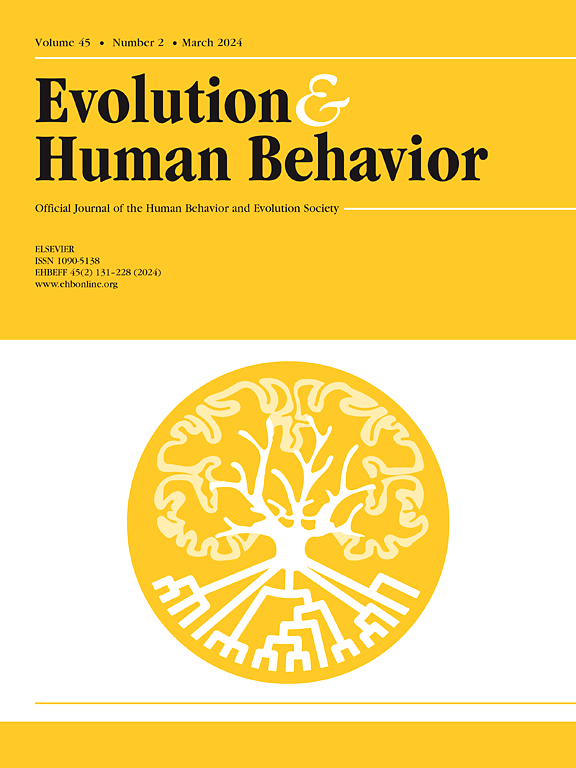Comfort with microbe-sharing contact across the COVID-19 pandemic: testing behavioral immune system predictions
IF 3.2
1区 心理学
Q1 BEHAVIORAL SCIENCES
引用次数: 0
Abstract
Theory within the behavioral immune system literature suggests that pathogen-avoidance adaptations should lead to increased contact avoidance under conditions of increased disease salience. The current study examined this hypothesis by assessing whether comfort with microbe-sharing interpersonal contact varied across the COVID-19 pandemic, when disease threats varied in salience. A longitudinal survey was conducted in the Netherlands in four periods, including May 2020 (N = 1003), February 2021 (N = 719), October 2021(N = 554), and June 2022 (N = 530). Results revealed that people reported greater explicit concerns about disease in earlier periods of the pandemic, when COVID-19 was more prevalent in internet searches and caused more deaths. However, comfort with microbe-sharing interpersonal contact was no lower early in the pandemic than later in the pandemic. Across the pandemic, people were more comfortable with microbe-sharing interpersonal contact with higher-valued targets. These findings cast doubt on the possibility that behavioral immune system mechanisms are sensitive to abstract, non-sensory indicators of pathogen threat, such as those characterizing a novel respiratory virus pandemic.
在COVID-19大流行期间与微生物共享接触的舒适性:测试行为免疫系统预测
行为免疫系统文献中的理论表明,在疾病显著性增加的情况下,病原体回避适应应导致接触回避增加。目前的研究通过评估在COVID-19大流行期间,当疾病威胁显著变化时,共享微生物的人际接触的舒适度是否有所不同,来检验这一假设。在荷兰进行了四个时期的纵向调查,包括2020年5月(N = 1003), 2021年2月(N = 719), 2021年10月(N = 554)和2022年6月(N = 530)。结果显示,在大流行的早期,人们对疾病的担忧更为明确,当时COVID-19在互联网搜索中更为普遍,并造成更多死亡。然而,在大流行早期,人们对共享微生物的人际接触的舒适度并不低于大流行后期。在疫情期间,人们更愿意与更有价值的目标进行微生物共享的人际接触。这些发现对行为免疫系统机制对病原体威胁的抽象、非感觉指标敏感的可能性提出了质疑,例如那些表征新型呼吸道病毒大流行的指标。
本文章由计算机程序翻译,如有差异,请以英文原文为准。
求助全文
约1分钟内获得全文
求助全文
来源期刊

Evolution and Human Behavior
生物-行为科学
CiteScore
8.30
自引率
9.80%
发文量
62
审稿时长
82 days
期刊介绍:
Evolution and Human Behavior is an interdisciplinary journal, presenting research reports and theory in which evolutionary perspectives are brought to bear on the study of human behavior. It is primarily a scientific journal, but submissions from scholars in the humanities are also encouraged. Papers reporting on theoretical and empirical work on other species will be welcome if their relevance to the human animal is apparent.
 求助内容:
求助内容: 应助结果提醒方式:
应助结果提醒方式:


